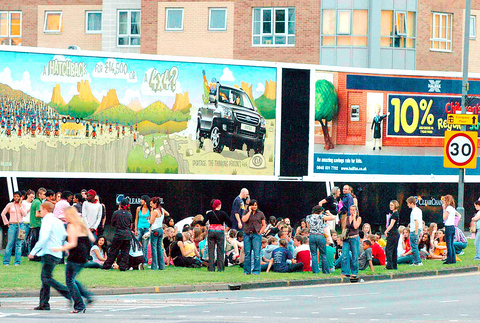Some 20,000 people were evacuated from the central English city of Birmingham overnight Saturday in response to a "credible threat" which no longer exists, police said.
The evacuation came amid heightened tensions in Britain since the Thursday morning rush hour bombings on London's transport system in which at least 50 people were killed and some 700 injured.
Police early yesterday lifted a cordon around the city center, including the nightlife hub, after bomb disposal squad officers carried out four controlled explosions on a bus before ruling a second suspect package harmless.

PHOTO: EPA
Paul Scott-Lee, chief constable for the West Midlands Police, told reporters yesterday that police had acted on a "credible threat" received by intelligence services that "was specific about the time and also the locations."
But Scott-Lee would not elaborate on the nature of the threat.
He put the threat in the context of the broader global climate on terrorism, saying it was unrelated to the suspicious packages which were found and turned out to be harmless.
"It was not a false threat. It was a serious threat. The intelligence indicated that the people of Birmingham were in danger last night. And we responded to make sure that the people were taken out of the danger area," he said.
He added that the suspect packages, including one with wires coming out, were not deposited as a hoax.
Asked if there was still a credible threat, he replied: "As we've carried out our operation, I can say that that particular threat has gone away."
"But I come back to what I said right at the beginning, given the world state and terrorism as it is, threats will remain but that one has been dealt with," he said.
The second package, a box with wires coming out and a switch on top, was found in a hotel in the Broad Street entertainment quarter.

Conflict with Taiwan could leave China with “massive economic disruption, catastrophic military losses, significant social unrest, and devastating sanctions,” a US think tank said in a report released on Monday. The German Marshall Fund released a report titled If China Attacks Taiwan: The Consequences for China of “Minor Conflict” and “Major War” Scenarios. The report details the “massive” economic, military, social and international costs to China in the event of a minor conflict or major war with Taiwan, estimating that the Chinese People’s Liberation Army (PLA) could sustain losses of more than half of its active-duty ground forces, including 100,000 troops. Understanding Chinese

The Ministry of Foreign Affairs (MOFA) yesterday said it is closely monitoring developments in Venezuela, and would continue to cooperate with democratic allies and work together for regional and global security, stability, and prosperity. The remarks came after the US on Saturday launched a series of airstrikes in Venezuela and kidnapped Venezuelan President Nicolas Maduro, who was later flown to New York along with his wife. The pair face US charges related to drug trafficking and alleged cooperation with gangs designated as terrorist organizations. Maduro has denied the allegations. The ministry said that it is closely monitoring the political and economic situation

‘SLICING METHOD’: In the event of a blockade, the China Coast Guard would intercept Taiwanese ships while its navy would seek to deter foreign intervention China’s military drills around Taiwan this week signaled potential strategies to cut the nation off from energy supplies and foreign military assistance, a US think tank report said. The Chinese People’s Liberation Army (PLA) conducted what it called “Justice Mission 2025” exercises from Monday to Tuesday in five maritime zones and airspace around Taiwan, calling them a warning to “Taiwanese independence” forces. In a report released on Wednesday, the Institute for the Study of War said the exercises effectively simulated blocking shipping routes to major port cities, including Kaohsiung, Keelung and Hualien. Taiwan would be highly vulnerable under such a blockade, because it

UNRELENTING: China attempted cyberattacks on Taiwan’s critical infrastructure 2.63 million times per day last year, up from 1.23 million in 2023, the NSB said China’s cyberarmy has long engaged in cyberattacks against Taiwan’s critical infrastructure, employing diverse and evolving tactics, the National Security Bureau (NSB) said yesterday, adding that cyberattacks on critical energy infrastructure last year increased 10-fold compared with the previous year. The NSB yesterday released a report titled Analysis on China’s Cyber Threats to Taiwan’s Critical Infrastructure in 2025, outlining the number of cyberattacks, major tactics and hacker groups. Taiwan’s national intelligence community identified a large number of cybersecurity incidents last year, the bureau said in a statement. China’s cyberarmy last year launched an average of 2.63 million intrusion attempts per day targeting Taiwan’s critical